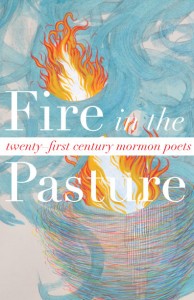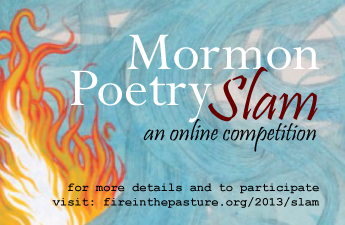 Two years ago today Peculiar Pages released Fire in the Pasture. Publishing the anthology was a watershed experience for me, for many of its contributors, and for Mormon poetry. It might be immodest of me to claim the latter if I wasn’t just reiterating what a trusted voice in Mormon arts has said. Glen Nelson of Mormon Artists Group has at least twice called Fire a landmark publication (see here and here). He’s even claimed that the book “is among the most important books on Mormonism to appear in the first years of the century.” As Fire’s editor, of course I agree with him. But I’ll leave it to others to argue the particulars of why it may or may not be that book.
Two years ago today Peculiar Pages released Fire in the Pasture. Publishing the anthology was a watershed experience for me, for many of its contributors, and for Mormon poetry. It might be immodest of me to claim the latter if I wasn’t just reiterating what a trusted voice in Mormon arts has said. Glen Nelson of Mormon Artists Group has at least twice called Fire a landmark publication (see here and here). He’s even claimed that the book “is among the most important books on Mormonism to appear in the first years of the century.” As Fire’s editor, of course I agree with him. But I’ll leave it to others to argue the particulars of why it may or may not be that book.
I will say, however, that Fire has been tremendously important to many of the poets included in its pages. Over the past couple years, I’ve received personal messages from a number of the book’s contributors who have mentioned that being published in the anthology fanned what had been a dying flame or added kindling to ignite the sparks of an emerging passion. This has been extremely fulfilling for me because while I was putting Fire together I had nightmares that the project would flop—as in an I’m-going-for-graceful-but-what-I-get-is-an-epic-belly-flop flop. I vented those fears to the heavens time and again, something that renewed my dedication to my task and helped me see it to completion. Learning later that the book has helped other poets discover or rediscover their voices has made me triply glad that I didn’t give way to my fears.
I say “triply glad” because, first, I was already happy to have been commissioned to the compile the anthology in the first place and, second, in the wake of Fire’s publication I’ve been given more opportunities to advocate for Mormon poetry on a bigger scale than might otherwise have been the case, with my work as Dialogue’s poetry editor and the publication of Field Notes on Language and Kinship being only two examples. Needless to say, to quote the words a fellow poet sent me in a recent email: being involved with Fire in the Pasture “has revolutionized my life and that is not an exaggeration.”
In my mind, these developments are worth commemorating.
Which brings me to this:
In observance of Fire’s second anniversary, I’m hosting a Mormon Poetry Slam. Now, this won’t be your run-of-the-Green-Mill slam because, among other things, it won’t be a live, face-to-face event; there will be no time limits placed on performances; and participants won’t be reading their own poems. It will, however, be a competition in which individual performances are judged by an audience of the readers’ peers.
Here are the rules:
1. All readers are welcome. You don’t have to be a poet or affiliated with Mormonism to participate.
2. Pick a poem written by a Mormon poet. The poem can be on any topic and of any length, but it must have been written by a poet (living or dead) who maintains/maintained some affiliation with Mormonism. If you’re not sure where to start, you can find lists of Mormon poets here, here, and here.
3. Record yourself reading/performing the poem. At the beginning of your performance, state the title of the poem you’re performing, the poet’s name, and “Read by [your name].” For instance, if I were performing Clinton F. Larson’s poem “To a Dying Girl,” I would begin: “‘To a Dying Girl’ by Clinton F. Larson. Read by Tyler Chadwick.” Be sure your recording is clear and in an easy-to-work-with audio format (i.e., .mp3, .wav, .m4a, etc.). If you don’t have access to audio recording software on your computer or your phone, here are three easy-to-use online resources: recordmp3.org, vocaroo.com, and SoundCloud.com.
Remember: your performance will be judged by an online audience of peers, so perform well. If you want to participate but are anxious about reading your poem aloud, check out these resources provided by the Poetry Out Loud National Recitation Contest.
4. Submit your audio file or a link to your audio file (if you recorded it online) via this email address:
![]()
Format the subject line as follows: [Your full name] reading “[Poem title]” by [Poet’s full name]. So, again, if I were submitting the performance referenced above, my subject line would be: Tyler Chadwick reading “To a Dying Girl” by Clinton F. Larson.
**The submission deadline is midnight, November 15, 2013.** That gives you just over two weeks from today to chime in (as it were).
After the submissions window closes, I’ll post the entries, the rules for judging, and the prizes participants will be vying for.
In the meantime, share the news of Mormon poetry’s first poetry slam far and wide. And after you’ve participated yourself, encourage others to join the fun. To that end, in fact, here’s an image and a reading (the one I’ve been at all through this post) to pass along through your social networking channels and to whet your appetite for what’s to come.
Receive event updates by joining/following the event on Facebook.
***


Pingback: Second Anniversary of Fire in the Pasture | Dawning of a Brighter Day
Pingback: Zion’s Poetess and the Mormon Poetry Slam
Pingback: Seven Days and Counting
Pingback: Let the Mormon Poetry Slamming Begin
Pingback: Mormon Poetry Slam, Day 1: Laura Craner Reads “Introduction to the Mysteries” by Patricia Karamesines
Pingback: Mormon Poetry Slam, Day 4: Sarah Dunster Reads “Ghazal” by James Goldberg
Pingback: Mormon Poetry Slam, Day 8: Eric W Jepson Reads “Close” by Amber Watson
Pingback: Mormon Poetry Slam, Day 11: Laura Craner Reads “Feel Me” by May Swenson
Pingback: Mormon Poetry Slam, Day 12: Eric W Jepson Reads “She Was Only Seven” by Natasha Loewen
Pingback: Mormon Poetry Slam, Day 13: Sarah Dunster Reads “Remembered Dream” by Jonathon Penny
Pingback: Mormon Poetry Slam, Day 14: Ben Abbott Reads “An Open Letter to Joseph Smith, Charlatan” by Jonathon Penny